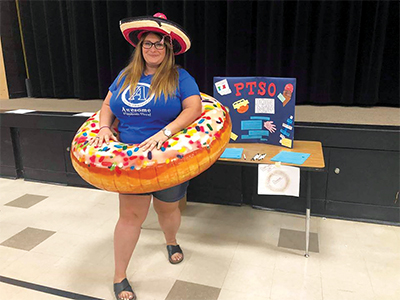16 Volunteer Recruitment Strategies for PTOs and PTAs

Get and keep more volunteers for your parent group with these approaches.
If recruiting new volunteers is up there on your list of uh-ohs, you’re not alone. Attracting (and then keeping) new help is a challenge for most groups at one time or another.
The good news is, it’s a challenge with lots of possible solutions. You might not solve the issue overnight; but even if you don’t end up with a giant roster of new names immediately, plugging away at volunteer recruitment can add to your ranks and help your group accomplish more.
1. Plan to work at it all year.
While back to school is a key time to talk to new people, recruiting new help is really a yearlong process. It’s great to set up a table at back-to-school night, but don’t stop there—other key recruitment times include a few months before a major event, for example.
2. Adjust your thinking.
You’ll open yourself up to a wider pool when you get comfortable with the idea that not everyone is interested in or cut out for the same volunteer commitments. Your time available and reasons for volunteering might be totally different from someone else’s, and that’s OK. No reason is less valid than another.
Join the PTO Today community (it's free) for access to resources, giveaways and more
3. Follow up—always.
It’s a giant no-no to put out volunteer sheets and then not follow up with every single parent who signed up. Even if you don’t have an immediate task for someone, reach out— enthusiastically and sincerely—to let her know you’re glad to have her along and you’ll be in touch soon with a task.
4. Be flexible and accommodating.
If someone is only available every fourth Friday for two hours, find a way she can pitch in on those days. If someone has an infant, look for jobs where she could bring the baby along, like handing out tickets at an event. Flexibility creates good vibes, and that makes people feel valued.
5. Be thoughtful.
Matching people to their interests or skills can make volunteering a better experience overall that, in turn, will encourage that volunteer to help out again. You can get a jump on this by providing a space on your back-to-school sign-up sheets for new volunteers to write in what they’d like to do.
6. Extend your outreach.
Reaching past your immediate school community to community volunteers, high schoolers, and others can add to your ranks. Also think about the kinds of opportunities you could offer to people outside of your regular core volunteers—this could include staffing events, helping in the classroom, and more.
7. Offer incentives.
Sweeten the deal by offering a reward, like free family admission to the event the parent is staffing or first pick of a shift for the next event. You’ll show your appreciation while providing a fun motivation to continue lending a hand.
8. Be positive and fun.
People have lots of demands and requests for their time, and there’s little reason to participate in something that feels cliquey or negative. Everyone wins if you build a reputation for being a fun, welcoming group that people want to be part of.
9. Think like a newbie (and share like an oldie).
Often, parents feel like parent group leaders talk to them like they already know the ins and outs, but they probably don’t. Freely share the types of things that would have made it easier for you when you first started. For example, give as much detail as you can when you ask someone to help with a specific event or program.
10. Be patient and understanding.
Sometimes it takes several conversations before someone will become an official volunteer. That said, try to recognize the balance between gently encouraging someone and accepting when someone isn’t ready or interested.
11. Emphasize short time commitments.
There are many ways for people to pitch in for short durations, either while they’re learning the ropes or because they only have time for short-term tasks. Allow them those opportunities early on; it can encourage them to take on more gradually.
12. Offer at-home jobs.
From updating a website to cutting out paper shapes for craft projects, there are plenty of ways people can pitch in from home if their schedule or other circumstances make it hard for them to come to the school. You can even get into the habit of setting aside those kinds of jobs and delegating them as opportunities come up.
13. Talk it up.
It’s tempting to rely on emails or flyers to get the word out, but think about your own (most likely overflowing) inbox—it’s way more effective to get personal. Even a few words about your parent group in the school pickup line can pique interest.
14. Ditch the guilt.
You may have felt tempted to cancel an event due to low volunteer response, but using guilt to entice people mostly just makes them feel bad. Even if they show up for that one event, they won’t be inspired to keep helping.
15. Don’t overmanage.
There are lots of ways to do something right. Offer some guidance, but allow new volunteers to try things their own way. It builds their confidence, which can encourage them to keep at it.
16. Say thanks—often.
From the start, make sure your volunteers know you how much you appreciate them. It doesn’t have to be complicated—even a texted “thanks so much for everything” following a big event means a lot. When volunteers truly feel appreciated, they’re more likely to spread the word.
32 Ideas for Volunteer Appreciation
Lessons From Leaders
Members of our PTO and PTA Leaders & Volunteers group on Facebook share some ideas for boosting recruitment and retaining volunteers.

I personally have made a complete fool of myself at events to try and show people that we are just silly, fun-loving parents! —Amber B.
We always like to stress [to new volunteers] that we just need a little of their time and they can choose how they help out. —Cristina L.
I found that when I told people why I personally volunteered…they agreed that it was a good reason to be a part of the PTA or donate an hour or two of their time. —Karen M.
If you speak from the heart it will shine through. —Nancy D.
I have found I've had a lot of success in personally asking people who have been involved in the event previously if they'd like to do it. —Annie I.
A personal ask of someone that you think would be good usually works for us. —Stephanie D.
We are going to try to be good about a few agenda-free socials, both with and without kids… we aspire to make more connections! —Ashley L.
From the second meeting when people started returning, I asked them to make copies with me, set up coffee, all those things that seem like “ooh she goes to the lounge without asking, or knows the copy system.” Just those little things make them feel like they can do it too. —Sarah J.
Sending information in multiple languages so everyone knows what is happening and needed may increase attendance. —Elizabeth P.
I try to say “hi” or “good morning” [to new volunteers] whenever I see them around campus, not just when I need a volunteer. —Amanda R.
Originally posted in 2019 and updated regularly.






















